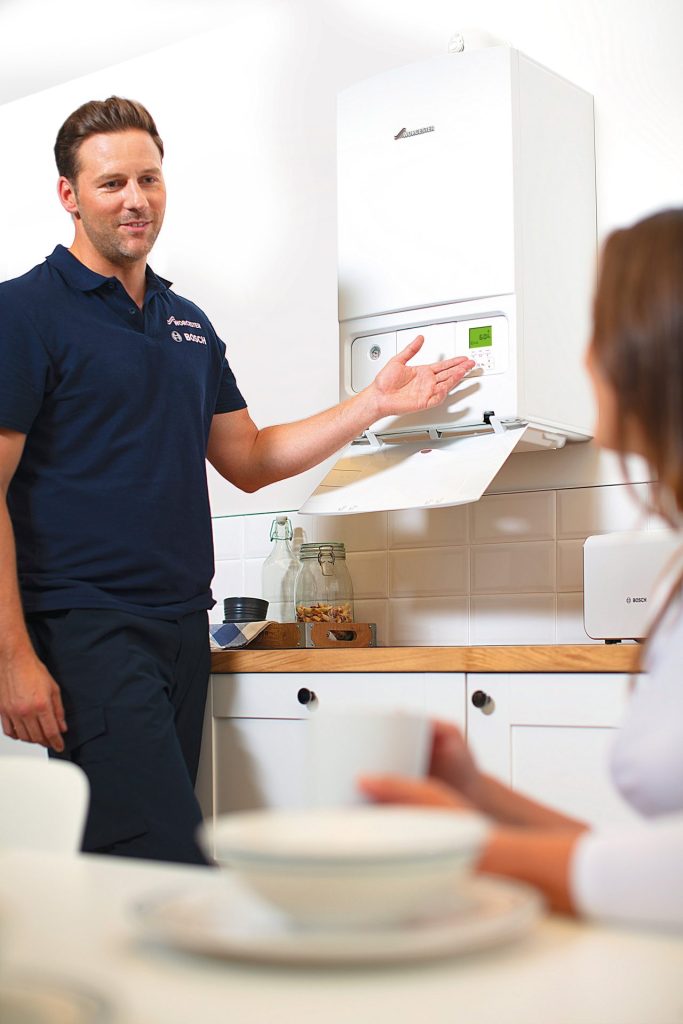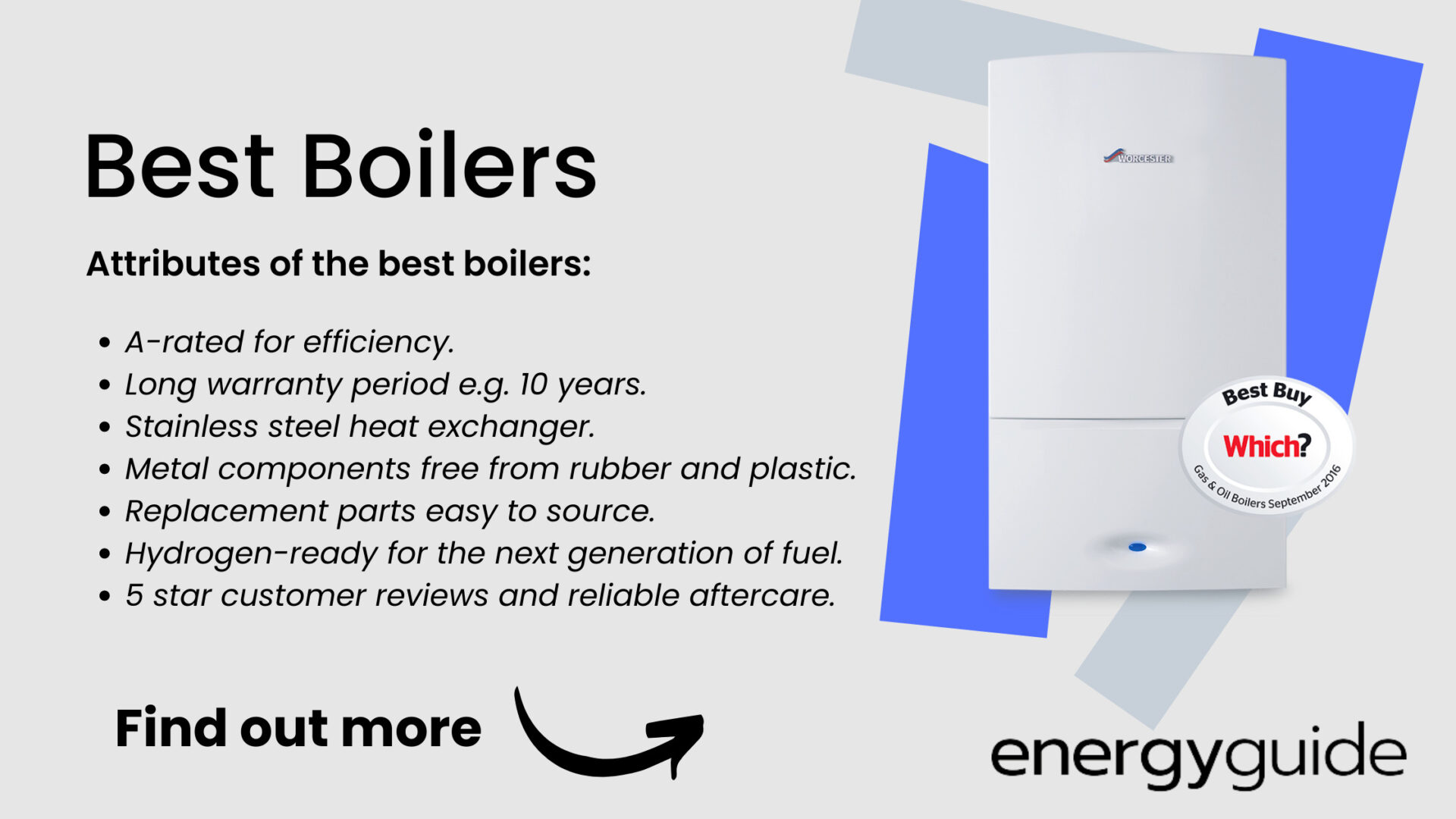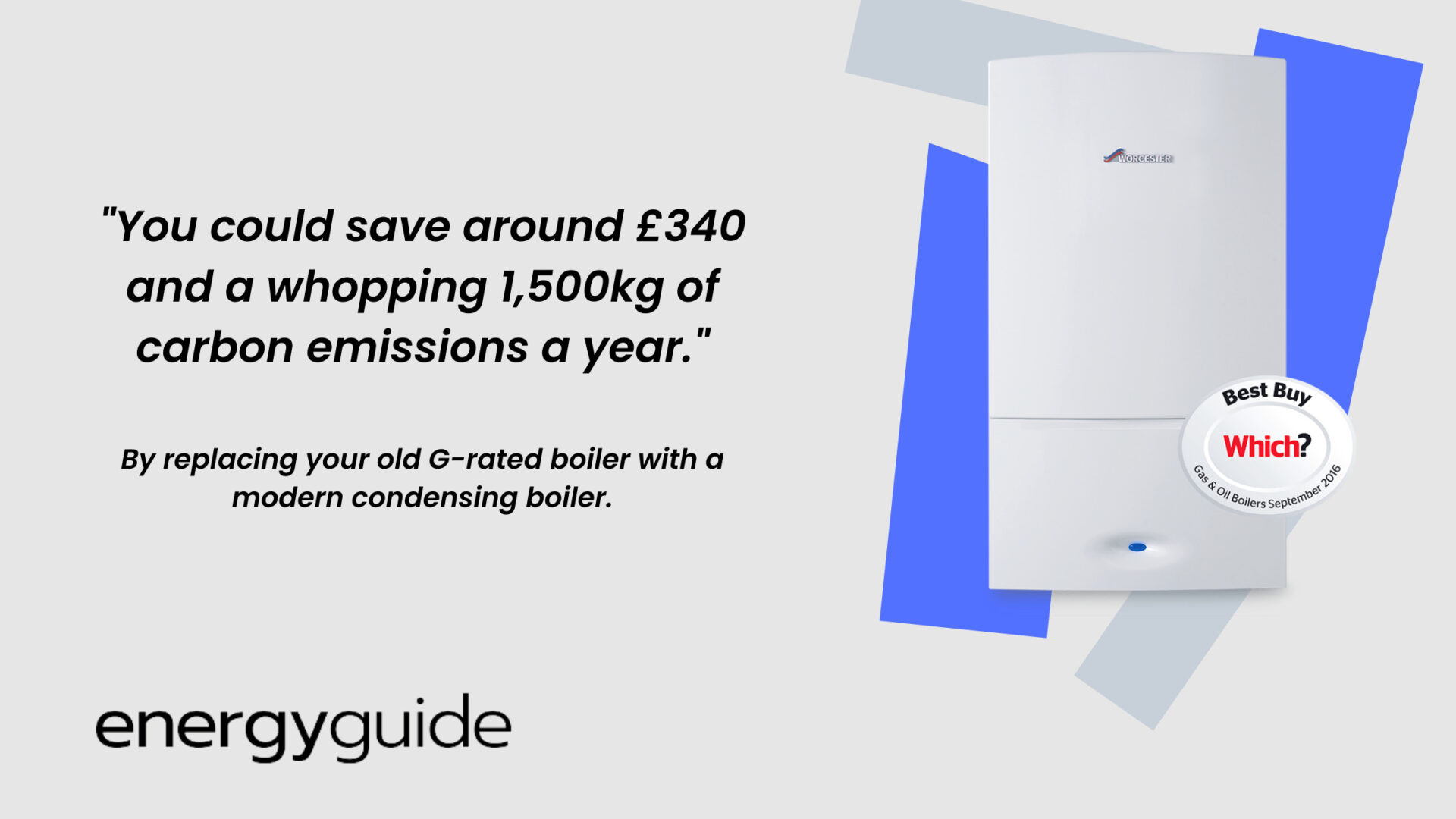Last Updated on January 20, 2026
Are you struggling with a rundown boiler and are wondering about new boiler costs? This guide explores how much you can expect to pay on new boiler costs in 2025.
A new A-rated condensing boiler can save up to £475 yearly on fuel bills in England, Scotland, or Wales. It can also make your home more comfortable and reduce carbon and greenhouse emissions.
Your boiler is the heart of the home, with heating and hot water accounting for over half of what you spend on energy bills. An old, inefficient boiler can lead to higher energy bills and wasted fuel, and it’s likely to break down more often.
The price of constantly repairing and maintaining an old boiler soon outweighs new boiler costs. Thus, investing in a new, modern boiler is worthwhile as it allows you to enjoy higher efficiencies and peace of mind knowing it will operate reliably.
🔥 Need a New Boiler? Get a Fixed Price in 90 Seconds
Don’t waste time phoning around — Heatable shows you the best boiler deals online in under two minutes. No sales calls, no hidden fees, just instant prices from a trusted installer.
Get Your Fixed Price NowBut what are the current new boiler costs in the UK and what will influence how much you pay?
Here’s everything you need to know about new boiler costs in 2025 and some savvy tips to help you save a few quid without compromising on quality.
So, let’s turn up the heat and get started, shall we?

Key Takeaways:
- New boiler costs can range from £600 to £3,600 in the UK.
- Factors like boiler type, brand, warranty length, installation complexity, and extras can affect the final cost.
- A like-for-like swap will generally be cheaper than installing a different boiler in a different location.
New Boiler Costs In The UK
New boiler costs can range between £600 and £3,600 in the UK in 2025.
The table below shows the average costs for different types of boilers, excluding and including installation.
| New Boiler Type | Cost (excl. Installation) | Cost (inc. Installation) |
|---|---|---|
| Combi swap | £600 – £2,000 | £1,500 – £3,500 |
| System boiler | £500 – £2,500 | £1,700 – £3,600 |
| Conventional boiler | £600 – £3,500 | £1,700 – £3,000 |
| Electric boiler | £600 – £2,500 |
How Much Is A New Boiler Installation?
As mentioned, the cost of a new boiler depends, which is not what most people want to hear but it is the reality.
Here are the various factors that come into consideration for any boiler quote:
- The type of boiler, e.g., combi boiler, system, or heat only.
- The brand of the boiler.
- The boiler warranty length that comes with the boiler.
- If you want the boiler moved to a new location on your property.
- The location of the boiler, e.g., in some cases, you may need scaffolding, which can increase the price.
- Any extras, e.g., radiators, pipework, a power flush, or thermostats.
- Whether it’s an emergency call-out or not.

Boiler Replacement Costs UK – Main Factors Considered:
As mentioned in the summary above, there are many factors you need to consider when working out how much a new boiler will ultimately cost you.
Here, we discuss them in more depth:
Common Types of Boilers In The UK
As mentioned, the type of boiler you have installed can impact the final cost.
In the UK, households install three main types of gas boilers. They include the following:
Combi or Combination Boilers
Combination boilers are by far the most common type of boiler in UK homes. Combination boilers combine all the components of a traditional heating system into one compact unit.
As a result, they can provide hot water and heating from a single unit on demand and are typically wall-hung.
Combination boilers take cold water directly from the mains and so do not need a hot water storage tank. The compact size makes them easier to install and ideal for homes with limited space.
Modern combi boilers use condensing technology to heat the water in the system efficiently by extracting latent heat from the flue gases.
Advantages of Combi Boilers
Combi boilers are a popular choice due to their various benefits. These include:
- Compact Size – They easily fit into bathrooms, kitchens, and airing cupboards, and you can control the entire system, including heating and hot water, from the same appliance.
- Saves Money – Purchasing a single unit can be cheaper than buying multiple system components. The streamlined design also makes them affordable to install and maintain.
- Highly Efficient – Modern combi boilers are A-rated with efficiencies above 90%. They waste less fuel and can help reduce your household’s energy bills.
- Instant Hot Water – Combi boilers don’t have to heat a large volume of water in a storage tank, which can take time to refill and reheat. They heat water when required when you turn on the hot water tap.
- Easy Installation – Swapping one combi boiler with another makes the installation easier since no complicated components and controls require separate installation, like a hot water cylinder.
Disadvantages of Combi Boilers
- Unsuitable for Large Homes – Due to their compact size, combi boilers have a limited water capacity and can only supply hot water to one tap at a time. As a result, they’re unsuitable for large homes with higher hot water demand, especially when multiple people need hot water simultaneously.
- Needs Good Mains Pressure – Combi boilers depend on good mains pressure since they get water directly from the mains supply. The combi boiler may not work effectively if your home experiences a low flow rate or pressure.
Check out our video on how to vet boiler brands/models in the UK:
Did you know the efficiency of your boiler can impact the amount of energy it uses and ultimately impact your heating bill costs? Check out our guide to the best condensing boilers to find out more.
You may also find our review of the best eco-friendly boilers of interest.
New Boiler Cost Guides by Boiler Type:
- Combi Boiler Costs.
- System Boiler Costs.
- LPG Boiler Costs.
- Condensing Boiler Costs.
- Back Boiler Removal Costs.
- Hydrogen Boiler Costs.
- Regular Boiler Costs.
- Heat Only Boiler Costs.
- New Boiler & Radiator Costs.
System Boilers
System boilers are also popular in UK homes and are boilers for busy homes. They’re ideal for properties with high hot water demands, or areas with poor water pressure.
Unlike combi boilers, which heat all water on demand, system boilers do this with a separate hot water storage cylinder. System boilers power your central heating while generating hot water that goes to a separate hot water cylinder/tank.
With system boilers, almost everything is built inside the unit, and the hot water cylinder for holding hot water is the only external part.
The system boiler takes its water directly from the incoming main supply without an additional tank in between, like regular boilers. This frees up space and offers much better water pressure.
System boilers can provide a consistent hot water supply to various outlets as long as the hot water cylinder is full. Thus, they’re suitable for medium to large homes with multiple bathrooms or homes with limited loft space and high hot water demand.
Advantages of System Boilers
- Easy Installation – The individual heating and hot water components are built into the system boiler, making it easier, quicker, and neater to install than a regular boiler.
- Meets High Hot Water Demand – System boilers can provide high levels of hot water on demand thanks to the separate hot water cylinder. Thus, they’re ideal for large or busy households, allowing you to use multiple taps simultaneously without pressure reduction.
- Compatible with Solar Power – You can pair the system boilers’ unvented hot water cylinders with solar panels to heat water. If you’re eco-conscious and thinking of installing solar water heating, it’s simpler for them to work with system boilers.
- Fast and Economical – System boilers operate faster thanks to a pump, making them more economical to run if your household regularly uses high volumes of hot water.
- Excellent Water Pressure – System boilers get water directly from the mains, offering a more consistent flow rate and better water pressure than regular boilers.
Disadvantages of System Boilers
- Needs More Space than Combi Boilers – Although they’re more compact than regular boilers, system boilers still take up more space than combi boilers due to the separate hot water cylinder.
- Cylinder Size Dictates Water Use – The size of your cylinder will dictate the amount of hot water your household can use. Once it’s empty, you’ll need to wait for the cylinder to fill up and the water to get hot.
- Hot Water Isn’t Instant – Since hot water is stored in a cylinder, it must be heated before you can use it. If it runs out, the system boiler has to heat more water and fill the cylinder before your home has hot water again.
Are you wondering which boiler manufacturers performed best? Check out our best boiler brands guide for the full rundown and if you are trying to determine who the best boiler installation company is, check out our Warmzilla and Boxt reviews.
Heat-Only Boilers
Heat-only boilers, also called conventional, regular, or open vent boilers, are older versions of the system boiler and work very similarly.
These traditional boilers feature a hot water storage cylinder, a cold water storage tank, and a feed and expansion tank.
The main supply feeds the cold water tank, which feeds into the hot water cylinder. A heat exchanger inside your boiler heats up the water before sending it to supply your radiators, taps, and showers with hot water.
The feed and expansion tank brings additional cold water into the boiler, ensuring a consistent water flow for the heating system.
Heat-only boilers can simultaneously supply hot water to multiple outlets, making them suitable for larger homes or businesses. They’re still widely used thanks to their compatibility with older heating systems and ability to manage high demand effectively.
Advantages of Heat-Only Boilers
- Compatible with Old Radiators – A heat-only boiler will be more suitable if you have an old property with an older radiator or heating system. Other boiler types can cause old radiator systems to malfunction or leak due to high pressure.
- Can Accommodate Low Water Pressure – Heat-only boilers are a good choice for areas with low water pressure since the cistern can maintain good water flow through gravity and the pump can ensure sufficient pressure in the system.
- Can Meet High Hot Water Demand – Heat-only boilers can effectively provide central heating for larger homes and are suitable for properties with multiple radiators, taps, and showers that require hot water simultaneously.
- Cheaper – Heat-only boilers can be a cost-effective option. They’re cheaper, and you can connect them to existing pipework or water storage tanks.
- Compatible with Solar Power – If you have a solar system or plan to install one, heat-only boilers can allow you to harness the sun’s power for water heating. This can reduce your energy consumption, and save you on energy bills while reducing your carbon footprint.
Disadvantages of Heat-Only Boilers
- Inefficient – Heat-only boilers can be more inefficient than other modern boiler systems. They usually use more energy to maintain the water temperature in the separate hot water cylinder, which can result in higher energy bills. They can also be inefficient if you don’t use a lot of hot water, as they can heat more water than you require.
- Complex Installation – Heat-only boilers have many working parts, and installation can take longer and cost more. In addition to the extra tanks, installing a heat-only boiler may need extra plumbing and pipework.
- Needs Plenty of Space – You’ll need enough space in the loft for the cold water, feed, and expansion tanks and a suitable space for a hot water storage tank (usually kept in an airing cupboard near the boiler itself).
- You Can Run Out of Hot Water – Once you use the hot water in the storage cylinder, you’ll need to fill up the tank and heat more water.
- Hot Water Isn’t Instant – You’ll need to set up the heat-only boiler to heat water before using it, unlike combi boilers, which provide hot water on demand.
As mentioned, various factors can impact the cost of a boiler quote, including the type of boiler. Typically, combi boilers are easier to install since they have fewer components.
How Does Boiler Brand Impact New Boiler Costs?
Like any other type of home appliance, some brands are more expensive than others. Sometimes it’s justified, and sometimes, it isn’t.
For example, some boiler brands contain higher grade and higher quality components, e.g., stainless steel heat exchangers and all metal parts, instead of those that use plastic.
In addition, some brands have better reviews, longer warranty periods, and a reputation for superior customer service, which can be especially important in a boiler breakdown emergency.
Who offers the best boilers deals in the UK? Check out our review of online boiler installation companies, boiler brands, and the best UK boilers that topped our list concerning new boilers in the current year.
How Does Boiler Warranty Period Impact New Boiler Costs?
Perhaps one of the most important considerations when buying any gas boiler is the warranty length offered.
Ideally, you want the boiler warranty to be as long as possible, not only is this a sure sign of a better quality boiler, but it also means you’ll be covered for repairs or a replacement for extra peace of mind.

Often, you will find you can buy a boiler cheaper, but the warranty period will be much lower, e.g., 2 years vs 10-year boiler warranties.
In addition, some brands offer a warranty, while others offer a guarantee, and while these do sound similar, there is a slight technical difference.
Essentially a warranty is an agreement from the manufacturer that they will diagnose and repair the boiler, but not necessarily entirely for free.
While a boiler guarantee is a promise that they will diagnose and repair the boiler free of charge.
Do you have a common boiler problem? Check out our quick-fix guide on boiler lockout, boiler ignition faults, boiler PCB faults, faulty diverter valves, and boiler timer issues.
| Boiler Manufacturer | Period (Years) | Guarantee or Warranty? |
|---|---|---|
| Viessmann | 5-10 years | Warranty |
| Ideal | 5-10 years | Warranty |
| Worcester Bosch | 5-10 years | Guarantee |
| Vaillant | 5-10 years | Warranty |
| BAXI | 3-10 years | Warranty |
How Does Moving Your Boiler Location Impact New Boiler Costs?
It’s typically cheaper to have your boiler installed in the same place it was, so if you do want to move your boiler to a new place, e.g., upstairs or in the attic, you should expect to pay more.
The reason for this is pretty simple – moving the boiler means re-positioning the pipework, which takes more time and costs more in materials.
Related reading:
Will you need Scaffolding?
In some cases, scaffolding will be required to replace your boiler, usually if it’s at a very high position, which would be considered unsafe to do with just a ladder.
This is an added cost since contractors and installers typically rent the scaffolding for the installation, which is an additional expense they factor into the job.
It’s worth noting that some companies, e.g. Boxt and Heatable, do not always charge extra for this, and it’s all part of their “fixed price” promise.
Do you require any extras?
If you want extras, this needs to be factored into the cost of new boiler installation.
For example, having your boiler replaced with the same type of boiler in the same location will be cheaper than having a different type of boiler installed in a different location.
It will also cost more if you want extras, e.g., a new boiler and all your radiators are replaced simultaneously.
Did you know that not only boiler models are wall-hung either, check out our complete guide on floor standing boilers here.
Emergency Install vs Pre-Planned Install
If your boiler breaks down suddenly in the depths of winter and you need it replaced as soon as possible, you may be dealing with an out-of-hours emergency install, which will have a premium.
Although it’s not always possible, it’s far better to plan a boiler install in advance rather than waiting until it’s already broken and you need it replaced urgently.

Common Boiler Installation Scenarios
Here are some of the most common boiler installation scenarios and their average costs:
Straightforward Combi Combi Swap
If you already have a gas combi boiler and you want it replaced with a new combi boiler in the same location, the good news is that this is considered relatively straightforward and one of the easiest types of boiler installations.
New boiler cost guides:
- System boiler prices UK.
- Hydrogen boiler costs.
- Costs to replace a conventional boiler with a combi boiler.
- Combi boiler prices UK.
- Back boiler removal costs.
How much does a straightforward combi swap cost?
How much is a new combi boiler?
On average, a combi boiler installation like this will cost between £1,500 and £2,000 depending on the brand, warranty, and area you live in.
As discussed, new boiler prices can vary considerably depending on the brand you choose and the warranty on offer.
A Boiler Conversion
If you want a boiler conversion, e.g., changing from a combi boiler to a system boiler or vice versa, this will typically cost more than a standard like-for-like replacement.
As previously discussed, the major reason for this is all the additional components that need to be installed and/or removed, e.g., the water tank, header tank, etc.
This means it can take more time and labour and cost more in materials.
What size boiler is right for your home? If you are thinking about a combi boiler, it is largely determined by the number of radiators in your home.
Check out our complete guide to new boiler installation here if you are wondering about the best type of boiler for your home.
How much may a new boiler cost? Are you considering converting from a conventional to a combi boiler? Use our boiler installation cost calculator to get an estimation.
How much does a boiler conversion cost?
The average cost of a boiler conversion, e.g., swapping from a combi to a system, will cost between £1,800 and £2,500.
Back Boiler Replacement
If you have an old-fashioned back boiler like the Baxi Bermuda (typically found above the fireplace), this will need to be decommissioned and removed. You’ll then install a new boiler, e.g., a combi boiler, in a suitable location.
Similar to a boiler conversion, replacing a back boiler takes more time and labour, and more materials are usually required.
Additionally, scaffolding may be required if the back boiler is in a high-up location, which can also add to the costs.
Check out our boiler brand price guides and comparisons:
- British Gas new boiler costs.
- How much is it to fit a new boiler?
- How much does a Vaillant boiler cost?
- Baxi boiler costs.
How much does a back boiler replacement cost?
The average cost of a back boiler replacement in the UK is between £2,000 and £2,500.
New Boiler Costs Summary
As you appreciate from the many factors discussed above, the cost of a new boiler installation can vary greatly depending on your unique situation.
If you want to secure the best price for your new boiler, you should always seek multiple quotes from various suppliers.
This allows you to get a good picture of how difficult your particular job actually is and how much it costs from the perspective of multiple experts.
As previously highlighted, some online boiler platforms now offer a “fixed price”, which means they won’t charge for any extras should they turn up on the day of the job and discover something else that wasn’t considered when the quote was provided.
Also, always remember to check the installer’s previous customer reviews, which is easy to do on platforms like Trustpilot, and ensure that they are on the Gas register and are legally allowed to install a gas boiler.
Sources and References
- https://energysavingtrust.org.uk/advice/boilers/